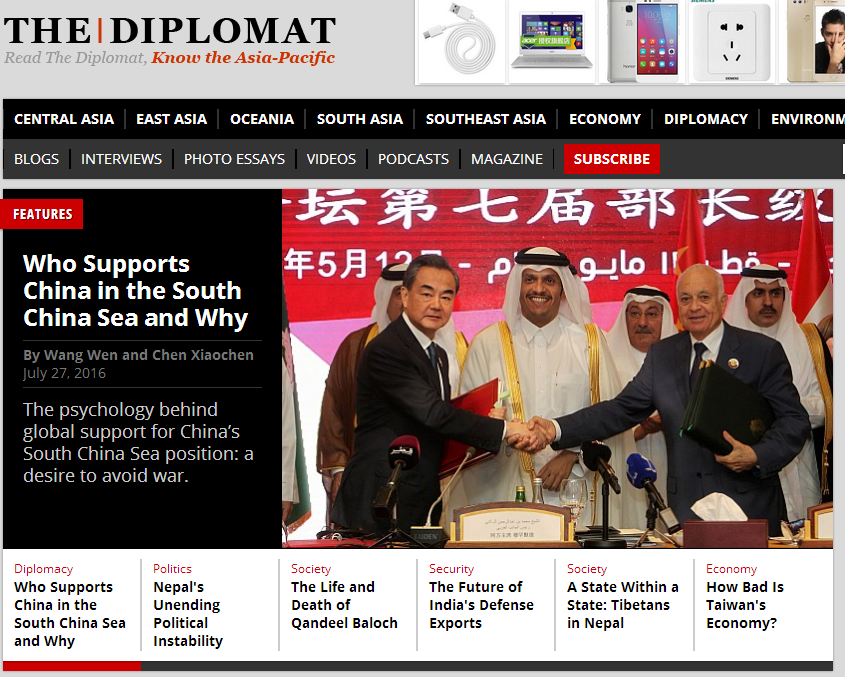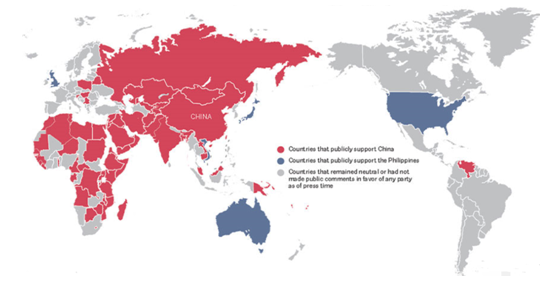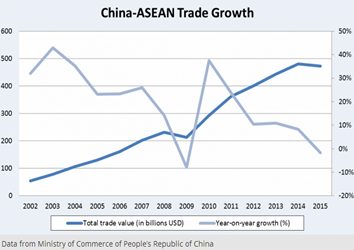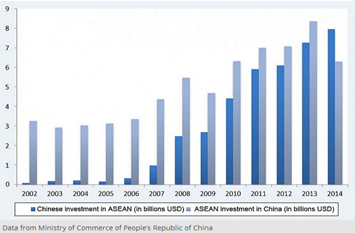发布时间:2016-07-28 作者: 王文
根据我们团队所做的简要研究,我们发现,至少有70个国家在各种场合支持中国在南海问题上的立场。我们认为,这个争议的原因是对"中国的立场"的界定不同。不过,无论如何界定,这些国家的表态背后,都反映了他们的心理状态--避免战争,显露出真正的世界主流民意是对南海冲突的焦虑,希望南海乃至世界和平。为此,我们应当抓住一切机会,突破零和博弈,维护南海和平,寻求亚太经济合作,用经济和金融手段"做大蛋糕"。

作者王文系中国人民大学重阳金融研究院执行院长,陈晓晨系人大重阳研究员。本文英文版刊于7月27日《外交学者》杂志官网首页。
南海仲裁案在中国国内公众中引发了空前一致的反对声音。而且,据报道,根据中国提供的数据,全世界共有66个国家在南海争端中支持中国的立场。不过,这一数字也引发了争议,尤其是在美国。
根据我们团队所做的简要研究,我们发现,至少有70个国家在各种场合支持中国在南海问题上的立场。我们认为,这个争议的原因是对"中国的立场"的界定不同。不过,无论如何界定,这些国家的表态背后,都反映了他们的心理状态--避免战争,显露出真正的世界主流民意是对南海冲突的焦虑,希望南海乃至世界和平。为此,我们应当抓住一切机会,突破零和博弈,维护南海和平,寻求亚太经济合作,用经济和金融手段"做大蛋糕"。
到底有多少国家支持中国的立场?
毫无疑问,中国国内社交媒体上对仲裁表达出的强烈反对显示出了中国人对中国政府立场的支持态度。而且,中国的立场还得到了其他国家的理解与欢迎。根据中国政府与媒体提供的消息,共有来自超过60个国家的近100个政党表达支持中国的立场。据《中国日报》报道,有66个国家对中国的立场表示支持。

然而,这遭到了美国媒体和智库的质疑。有美国智库认为,只有10个国家。我们自己也收到了这样的质疑邮件。
数字差异如此巨大,我们--中国人民大学重阳金融研究院国际研究部团队--必须通过自己的研究来核实。我们进行了网络海量搜索,找出了原始数据来源,包括官方声明、外交文件、谈话纪要和媒体报道。我们也检索了中国外交相关数据库、新华社平台与多媒体数据库、我们自己的新闻数据库,包括来自彭博社和路透社的相关数据。
引人注目的是,我们发现,70个国家表达了对中国的立场的支持,这比中国媒体所说的还要多。我们在附录中列入了这些国家的列表与表态的日期。据我们的全球网络信息,还有其他国家在私下表示支持;我们仅计算了公开表达支持的国家。我们团队也有可能遗漏了一些表示支持的国家。
为什么数字差异如此之大?
其中一个原因很明显:有一些支持的声音并不是用英文表达的,而是使用中文、法文、西班牙文、阿拉伯文、斯瓦希里语、高棉语或其他语种。因此,英语世界中的一些人并没有找到这些支持声音。
更为重要的是,我们认为,中国的立场的实质并没有得到美国媒体与智库的理解。在我们看来,中国的立场可以被解读成如下四条:
(a)中国不参与仲裁、不接受、不承认也不执行仲裁庭的裁决。
(b)中国始终坚持以和平谈判的方式,和平解决南海争端。
(c)中国坚持以对话的方式解决争端,维护南海和平与稳定,与《南海各方行为宣言》规定的相关方直接谈判解决争端,同时中国将会继续与东盟国家共同维护地区和平与稳定。
(d)临时仲裁法庭既不是国际常设仲裁庭的一个组成部分,也不是国际法院的一部分。它对仲裁案的核心领土争端并没有管辖权。仲裁案自身是充满瑕疵的。因此,这份裁决不具有法律约束力,也不代表国际法。
必须注意的是,支持以上任何一个观点都被视为支持中国的立场。相反,那些公开认同仲裁庭合法性,认为中国应该承认与执行裁决的国家就是反对中国的立场。
从这一点看,据我们研究,至少有70个国家从以上四个角度,以单边、双边或多边的方式对中国的立场表达了支持。他们全都欢迎以和平谈判的方式解决争端。而菲律宾单方面的仲裁实际上违反了其走对话、谈判道路的承诺。在这些国家中,确实有一些公开支持中国不接受仲裁的立场。但是,这只是"中国的立场"的一部分。美国媒体与智库只不过是在缩小和曲解中国的立场。
总而言之,多数国家对南海争端的表态可分为三种:
第一种,以日本等为代表,支持菲律宾的立场,认为中国应该遵守和执行"仲裁"。这一种国家数量很少。中国日报在图示中标出了了5个,但我们团队只确认了3个:日本、澳大利亚和美国。图中的越南与英国并不在反对中国的立场的国家之中(根据我们的定义)。据日本媒体报道,日本在乌兰巴托举行的亚欧会议上提出将南海问题列为会议议题,但除了菲律宾外,没有其他任何一个国家响应。
第二种,坚定支持中国不接受仲裁的立场,比如巴基斯坦、柬埔寨和一些非洲国家。这些国家数量上要比第一种多。例如,在6月20日柬埔寨国家电视台报道的一次公开讲话上柬埔寨总理洪森透露出某些域外国家,据信可能是日本,在仲裁问题上对东盟国家施加外交压力。他还表达了对仲裁的反对。在7月12日巴基斯坦外交部官方网站上发布的一个媒体声明中,这个中国的邻国重申了其对中国根据《联合国海洋法公约》第298条所做排除声明的支持态度。在非洲国家中,肯尼亚于7月15日在其外交部网站上公开声明尊重中国根据《公约》第298条所做的排除的权利。冈比亚,另一个西非沿海国家,通过其国家电视与广播电台清楚的表达了仲裁庭对南海划界没有管辖权,从而支持了中国的立场。
最后,很多国家支持中国"依据《南海各方行为宣言》,通过协商与谈判方式解决争端"的立场,他们算是第三类。将第二类与第三类加起来,我们找到了总共70个国家,但也有可能存在遗漏。据我们智库的全球网络了解,还有几十个国家也持这一种态度,但迫于某些压力并没有或不敢表达。我们并没有将这一部分计入这70个国家之中。
因此,我们主要的研究发现是,中国官方做出的"至少66个国家支持中国的立场"的声明是站得住脚的;事实上,我们团队找到的还多了4个。另一个研究成果是,尽管第二类与第三类对中国的立场也许重点强调不一样,他们都欢迎以上四点所表达的中国的立场。考虑到中国政府坚持和平谈判解决争端,持这两类观点的国家都认可以和平谈判的方式解决争端。更进一步,多数国家不想对中国或美国表达强硬态度,表明了这些国家对冲突的焦虑:这是支持名单背后的心理与真正的问题所在。
"表态"背后是世界对冲突的焦虑
我们认为,上述事实背后,反映出当今世界在南海问题上的共识--和平。而一些国家持这种态度却不敢公开讲,反映出世界人民对南海可能爆发冲突感到焦虑,对中美之间存在"新冷战"可能感到焦虑,对不得不在中美之间"选边站"感到焦虑。从这个角度讲,说支持中国的国家只有10个,不仅是对"中国的立场"的缩小和曲解,还同样没有认识到其他国家的立场。无论是10个还是70个,世界的真正主流民意--和平与对冲突和战争的焦虑才是真正的话题。
近两三年来,国际格局动荡与冲突因素上升,一些人担忧社会动荡与大规模暴力重返舞台,也担忧大国之间的互不信任如果得不到妥善处理,将会导致新的"冷战"乃至"热战"。
亚太地区一直被称为"冷战博物馆",这一地区的地缘政治和传统安全问题没有得到最终的解决,甚至近年不断升温。尤其是美国"重返亚太"、"亚太再平衡"以来,这一地区紧张局势不断升级。
南海是近期中美关系中最激烈冲突的焦点。然而在南海问题上,一些国家发现自己进退两难:既担心经济上失去中国的支持,又担心军事上得不到美国的保证。还有一些国家,担心自己所在区域组织因为南海问题而出现分裂。
除了前面提到的柬埔寨,我们还注意到,新加坡与泰国也在仲裁之后也发表声明,不介入南海争端,呼吁维持南海和平,和平解决争端。在南海问题上,东盟并没有形成一致意见。这反映出即使是东盟,大多数国家也避免在中美之间"选边站"。
我们还能注意到,大量非洲和中东国家表态支持中国在南海问题上的立场,呼吁直接当事国和平谈判解决争端。考虑到近期中东和非洲恶化的安全局势以及他们本国被殖民的历史,这并不奇怪。
在南海升温的同时,中东和非洲的极端主义活动越发活跃。在7月6日华盛顿特区一次内部交流会上,乔治·华盛顿大学教授AmitaiEtzioni提醒我们,美国在中东和非洲更积极地打击恐怖主义和极端主义,同在南海一样也能维持在盟友中的可信度,且不需要承担与中国冲突的风险--中国在这些反恐问题上的立场与美国趋同。
看看7月14日尼斯的悲剧,再看看喀布尔的伤亡惨剧,更不用提中东的持续动荡,你也许就会同意我们的结论:中美应该联手对付共同的敌人:国际恐怖主义和极端主义,而不是把精力用在南海的"零和博弈"上。
突破零和博弈寻求亚太合作
当中国前国务委员戴秉国7月5日在华盛顿特区,在我们人大重阳与卡内基举办的中美智库南海问题对话会上,称南海仲裁结果只是"一张废纸"的时候,我们几乎已经忘了他讲话的主旨是南海需要"降温"了。的确,不管民间舆论如何反应,南海仲裁案的"熔断点"--7月12日已经过去,各方正在评估下一步的博弈,设想更长期的格局。正如前文已经提到的,世界的主流民意依然是和平,无论南海争端各方愿不愿意,争端终将和平解决,合作共赢将是未来主流。
实际上,菲律宾也正在为维护南海和平而努力。菲律宾新总统杜特尔特在裁决出炉后明智地表现出低调、克制与合作的姿态。据报道,菲律宾前总统拉莫斯--也是我们作者的朋友--将担任特使访华。这些都表明,和平与稳定依然是"后仲裁"时代南海各方的共同利益,这为解决问题提供了基础。
在美国方面也是如此。正如杰弗里·贝德在布鲁金斯学会的一份对华政策报告里所说,中美虽然在南海问题上存在分歧,但是在全球治理层面,中国是越来越重要的利益攸关方,中美存在许多共识。特别是在经济领域。今年在中国杭州将会举行G20峰会,这将是中国再次带动全球经济复苏的一次机会。为什么不能在南海上也达成合作呢?
事实上,现在已经出现了好的征兆。我们很高兴看见美国海军作战部长约翰·理查森上将于7月17日成功访问中国,与吴胜利上将进行了富有成果的磋商。我们希望这次访问能够成为"后仲裁"时代中美军事交流的新起点。
南海地区能够实现多方的合作治理。正如作者在上述对话会上讲的那样,对南海周边渔民最大的威胁不是中国,不是美国,而是台风。各方,当然包括中美双方,可以在建设气象站、数据共享、台风预警和气候变化联合研究方面展开合作。在核心军事领域,中美也已经存在合作机制,中国已多次参与"环太平洋"军演,本文写作之时正有一支中国舰队在夏威夷与美国海军协同演练。现在正是我们为紧张局面降温,启动现有的军事交流机制的时候。
我们也应将合作开发与更广阔领域的经济合作提上日程。不久以前,菲律宾杜特尔特新政府表示,希望与中国共同开发南海资源。菲律宾拥有一些非争议的海洋主权,但缺少技术与资金限制了它对海域的开发,而中国拥有海域资源开发的技术和资金,这一前景让人回想起中国前领导人邓小平在会见菲律宾前领导人时对南海问题提出的"搁置争议,共同开发"。
最后,正如我们在此前的文章所提到的,南海问题将不会阻挡中国与东盟的经济与金融合作。中国提出的"21世纪海上丝绸之路"倡议与"湄公河-澜沧江机制"刚刚起步,它描绘了一个比自贸区更多元化,更灵活开放的共赢愿景,东盟各国可以从合作中获取急需的制造业、基础设施和金融投资和"金融基础设施"。而且,亚洲基础设施投资银行(AIIB)是一个更加具有包容性和可行性的组织。菲律宾正是该组织的创始国家。当然,我们也欢迎日本和美国加入亚投行并从中获利。


在围绕"中国的立场"的诸多表态背后,南海乃至整个亚太的和平是世界主流民意。中国、美国和其他国家应该携手合作,共同发展,集中精力联合反恐,加强经济与金融合作,最终将全球经济从萧条和失衡中带出来。
(中国人民大学重阳金融研究院实习研究员常玉迪对本文做出了贡献。我们研究团队还有人大重阳研究助理程阳与周西蒙、人大重阳实习生苏越和董一。)
附录:在南海问题上发声支持中国的国家一览表
非洲(39国):
Africa(39):
肯尼亚 The Republic of Kenya 06/15/2016
坦桑尼亚 The United Republic of Tanzania 05/31/2016
赞比亚 The Republic of Zambia 06/13/2016
喀麦隆 Republic of Cameroon 06/15/2016
埃塞俄比亚 The Federal Democratic Republic of Ethiopia 06/15/2016
莱索托 Kingdom of Lesotho 05/27/2016
马拉维 Republic of Malawi 06/22/2016
马里 The Republic of Mali 07/06/2016
尼日尔 The Republic of Niger 05/19/2016
乌干达 The Republic of Uganda 05/30/2016
厄立特里亚 The Commonwealth of Eritrea 05/30/2016
塞拉利昂 The Republic of Sierra Leone 06/09/2016
加蓬 The Gabonese Republic 05/12/2016
中非 The Central African Republic 06/28/2016
几内亚比绍 The Republic of Guinea-Bissau 06/24/2016
几内亚 The Republic of Guinea 07/19/2016
贝宁 The Republic of Benin 07/11/2016
刚果(金)Democratic Republic of the Congo 06/28/2016
津巴布韦 Republic of Zimbabwe 06/30/2016
安哥拉 The Republic of Angola 07/01/2016
利比里亚 The Republic of Liberia 07/05/2016
塞内加尔 The Republic of Senegal 07/08/2016
突尼斯(通过《多哈宣言》)The Republic of Tunisia Doha Declaration * 05/12/2016
摩洛哥(通过《多哈宣言》)The Kingdom of Morocco Doha Declaration 05/12/2016
莫桑比克 The Republic of Mozambique 05/18/2016
刚果(布)The Republic of Congo 06/20/2016
布隆迪 The Republic of Burundi 05/18/2016
多哥 The Republic of Togo 05/17/2016
阿尔及利亚(通过《多哈宣言》)People‘s Democratic Republic of Algeria Doha Declaration 05/12/2016
苏丹 The Republic of Sudan 04/28/2016
吉布提(通过《多哈宣言》)The Republic of Djibouti Doha Declaration 05/12/2016
利比亚(通过《多哈宣言》)State of Libya Doha Declaration 05/12/2016
毛里塔尼亚(通过《多哈宣言》)The Islamic Republic of Mauritania Doha Declaration 05/12/2016
索马里(通过《多哈宣言》)The Somalia Democratic Republic Doha Declaration 05/12/2016
科摩罗(通过《多哈宣言》)Union of Comoros Doha Declaration 05/12/2016
冈比亚(通过《多哈宣言》)Islamic Republic of Gambia 04/21/2016 Doha Declaration 05/12/2016
南非 The Republic of South Africa 06/22/2016
埃及(通过《多哈宣言》)The Arab Republic of Egypt Doha Declaration 05/12/2016
亚洲(22国):
Asia(22):
也门(通过《多哈宣言》)Yemen Republic Doha Declaration 05/12/2016
阿曼(通过《多哈宣言》)Sultanate of Oman Doha Declaration 05/12/2016
文莱 Nation of Brunei 04/23/2016
黎巴嫩(通过《多哈宣言》)Republic of Lebanon Doha Declaration 05/12/2016
伊拉克(通过《多哈宣言》)Republic of Iraq Doha Declaration 05/12/2016
斯里兰卡 The Democratic Socialist Republic of SriLanka 04/09/2016
阿富汗 Islamic Republic of Afghanistan 05/18/2016
孟加拉国 People’s Republic of Bangladesh 04/27/2016
老挝 Lao People’s Democratic Republic 04/23/2016
柬埔寨 Kingdom of Cambodia 04/23/2016
约旦(通过《多哈宣言》)The Hashemite Kingdom of Jordan Doha Declaration 05/12/2016
巴林(通过《多哈宣言》)Kingdom of Bahrain Doha Declaration 05/12/2016
乌兹别克斯坦 Republic of Uzbekistan 06/24/2016
巴勒斯坦(通过《多哈宣言》)The State of Palestine Doha Declaration 05/12/2016
吉尔吉斯斯坦 Kyrgyz Republic 04/27/2016
塔吉克斯坦 Republic of Tajikistan 06/24/2016
科威特(通过《多哈宣言》)State of Kuwait Doha Declaration 05/12/2016
卡塔尔(通过《多哈宣言》)State of Qatar Doha Declaration 05/12/2016
巴基斯坦 Islamic Republic of Pakistan 04/28/2016
阿拉伯联合酋长国(通过《多哈宣言》)United Arab Emirates(UAE)Doha Declaration 05/12/2016
沙特阿拉伯(通过《多哈宣言》)Kingdom of Saudi Arabia Doha Declaration 05/12/2016
哈萨克斯坦 Republic of Kazakhstan 04/28/2016
欧洲(4国):
Europe(4):
俄罗斯 The Russian Federation 04/29/2016
塞尔维亚 Republic of Serbia 06/19/2016
白俄罗斯 The Republic of Belarus 04/27/2016
美洲(3国):
America(3):
委内瑞拉 Bolivarian Republic of Venezuela 05/10/2016
多米尼克The Commonwealth of Dominica 06/24/2016
大洋洲(2国):
Oceania(2):
巴布亚新几内亚 The Independent State of Papua New Guinea 07/08/2016
瓦努阿图 The Republic of Vanuatu 05/25/2016
国际组织(2个):
International Organizations(2):
阿拉伯国家联盟 League of Arab StatesDoha Declaration 05/12/2016
上海合作组织 Shanghai Cooperation Organization 06/24/2016
*这些国家通过在2016年5月12日中国-阿拉伯国家合作论坛上共同通过的《多哈宣言》表达了对中国立场的支持,用中阿两种文字发布,6月即在论坛官方网站上可见。《华尔街日报》7月17日一篇报道却声称其“正在翻译”。
点击查阅70国如何支持中国的南海立场
特别说明:本报告的版权为中国人民大学重阳金融研究院所有,未经许可,任何机构和个人不得以任何形式发表,引用须注释。
以下是英文版:
Who Supports China in the South China Sea and Why
By Wang Wen and Chen Xiaochen Source: The Diplomat Published: 2016-7-27
The South China Sea arbitration case has elicited almost unanimous public opposition in China. Besides this, it has been reported that 66 countries worldwide have endorsed China’s position on the South China Sea. Yet that figure also caused controversy, especially in the United States.
According to our team’s research, we have found at least 70 countries supporting China’s position on various occasions. We find that the reason for the controversy over the figure comes down to different definitions on “China’s position.” But no matter how it is defined, the psychology behind these statements is a desire to avoid taking sides between China and the United States, showing the reality of a fundamental global consensus on peace and wide-spread anxiety toward the potential for conflict in the South China Sea. Thus, we should take every opportunity to go beyond the “zero-sum game” in order to maintain peace in the South China Sea, to seek Asia-Pacific economic cooperation, and to make the “cake” bigger using economic and financial means.
How many countries support China’s South China Sea position?
There is no doubt that Chinese almost unanimously support their government’s official position on the South China Sea, shown by the firestorm of social media comments soon after the award. Moreover, China’s position is also welcomed and understood by other countries. According to the Chinese government and media, nearly 100 parties from more than 60 countries declared their support for China’s position on the South China Sea issue. China Daily counted 66 countries, as shown in the map below.
The figure, however, encountered doubts from American media and think tanks. The Asia Maritime Transparency Initiative argued that the real number was only ten. We personally also received emails expressing similar doubts.
Considering such a huge gap in the count, our research team at the international studies department of Chongyang Institute for Financial Studies, Renmin University of China (RDCY), sought to verify on our own by conducting an independent count. We explored the issue by extensively searching the internet, and then looked for original sources including media reports, official statements, diplomatic documents, and talking points. We also searched the Chinese foreign affairs database, Xinhua‘s news and multimedia database, and our news citation system with data from various sources such as Bloomberg and Reuters to verify.
Strikingly, we identified 71 countries that have expressed their support for China’s position, even more than reported by Chinese media. In addition, the League of Arab States and Shanghai Cooperation Organization are also in line with China. (We have listed the countries and sourced all of the statements, with the date of issue, in the appendix below). It is said some others privately expressed support to China according to our global network, but we only counted the countries that went on record. It is also possible that our team may have miss some countries that are supporting China.
Why is there such a big gap in the number?
One reason is quite obvious: some of these statements of support are not available in English. They are expressed and available in Chinese, French, Spanish, Arabic, Swahili, Khmer, or other languages. Therefore, some analysts in the English-speaking world may have merely failed to find them.
More importantly, though, the discrepancy has something to do with the essence of “China’s position.” Simply put, we suppose most American media and think tanks have not yet understood what “China’s position” means. In our view, China’s position on the South China Sea issue can be interpreted as below:
1.China does not participate in the arbitration, nor accept, recognize, or implement the award.
2.China will adhere to peaceful negotiations and settlements of the South China Sea dispute.
3.While disputes should be settled by the parties directly concerned in accordance with the Declaration on the Conduct of Parties in the South China Sea (DOC), China will work with ASEAN countries to maintain peace and stability in this region.
4.The temporally-established (ad hoc) arbitral tribunal is neither a part of the Permanent Court of Arbitration (PCA) nor the International Court of Justice (ICJ). It does not have jurisdiction over the territorial disputes, which is the core of the arbitration. The arbitration itself is flawed in procedure. Thus, the award is not legally-binding, nor representing international law.
To directly support any of those components is to support China’s position. On the contrary, those countries that openly endorse the arbitral tribunal as affiliated to PCA and assert China should recognize and implement the award oppose China’s position.
In this regard, at least 70 countries, based on our research, endorse China’s position in various angles of the four components above, and they did so in various ways: unilaterally, bilaterally, or multilaterally. All of them welcome peaceful negotiations to settle the disputes. In addition, we should bear in mind that
Philippines’ ex-parte arbitration violates its own commitment to peaceful dialogue and negotiation. Among these countries, some expressed their public and firm support for China’s stance of non-acceptance of the arbitration. Nonetheless, “non-acceptance” is only part of China’s position. American media and think tanks who use this alone for their counts misinterpreted the implication of China’s position.
Generally speaking, most countries’ attitudes toward the South China Sea issue can fall into three categories.
Counties in the first category, represented by Japan, oppose China’s position by supporting the Philippines’ stance while insisting China should recognize and implement the result of the arbitration, which is claimed to officially represent the PCA. This opinion is rare. China Daily mapped five in its report, but our team can only identify three: Japan, Australia, and the United States. Vietnam and the United Kingdom, though represented on the map, do not meet the definition of opposing China directly. In this circumstance, although Japan indeed raised the issue at the Asia-Europe Meeting (ASEM) in Ulaanbaatar, it was echoed by no country except the Philippines itself, according to Japanese media such as Japan Today, The Japan Times, and The Japan News.
The second group includes countries that explicitly expressed their firm support to China on the arbitration, such as Pakistan, Cambodia, and some African countries. This group is bigger than the first one, but still limited. For example, in a public speech broadcast on TVK, Cambodia’s state-owned television network, on June 20, Prime Minister Hun Sen revealed diplomatic pressure over the South China Sea from “certain country outside the region” — widely believed to refer to Japan — and expressed his objection to the arbitration. In a press release found on the official website of the Ministry of Foreign Affairs of Pakistan on July 12, the Chinese neighbor reiterated its support for China on its statement of optional exception in light of Article 298 of the United Nations Convention on the Law of the Sea (UNCLOS). Among African countries, Kenya issued a statement on June 15, also on its MFA website, declaring its respect for China’s right of optional exception under UNCLOS Article 298. Gambia, another coastal country in West Africa, has stated its support of China’s position on the arbitration by clearly saying the arbitral tribunal has no jurisdiction over delimitation in the South China Sea through the Gambia Radio and Television Service (GRTS).
Last, many countries, categorized as the third group, support China’s position in terms of resolving the disputes through consultations and negotiations while following the Declarations on the Conduct of Parties in South China Sea (DOC). Combining the second and the third groups, we have found 71 countries, with probably some still missing. Our global think tank network and foreign embassies in Beijing told us some other countries also hold similar attitudes, but have not openly expressed their position due to some “pressure.” We did not include them in our count.
Therefore, our key finding is that the claim by Chinese officials that at least 66 countries support China’s position is verified and solid; in fact, we found five more countries. Although the second and third groups as outlined above may have different stresses on China’s position, they all welcome at least one of the four components. Considering China’s official position on the peace negotiations, these two types of opinions acknowledge the path of peace talks.
Further, the fact that most countries do not show a hardline stance toward either China or the United States illustrates their anxiety about conflicts. This psychological factor is the fundamental issue behind the rally of support.
The Root Cause: Anxiety Over Conflict
In our opinion, the moderated stances of most countries can be explained by the global fundamental consensus over the South China Sea issue — a desire for peace. However, some people are worried about the possibility of an armed clash in the South China Sea and even the start of a “new Cold War” which may force countries to take sides between the United States and China. From this point of view, those who assert that only 10 countries support China not only too narrowly define “China’s position,” but also fail to fully recognize the nuance of other countries’ positions. Moreover, whether the count is 10 or 70, the real issues behind these statements are the global consensus on peace and worldwide anxieties or even fears of conflict — or worse, war.
In recent years, conflicts and turbulence have risen across the world. Thus, there are great anxieties about social unrest and mass violence; there are also anxieties about the distrust between major powers, which may very likely result in a new Cold War or even hot wars if badly managed.
East Asia has long been called “The Museum of Cold War,” where long-standing geopolitical and traditional security issues have not yet been settled and even have been heating up in recent years, especially after the “pivot to Asia” was introduced.
Recently, the South China Sea has been the focal point of Sino-U.S. relations. However, when it comes to the South China Sea issue, some countries find themselves trapped into a dilemma: not only do they worry about the loss of economic support from China, but also they are worried about the loss of security support from the United States. Moreover, some may worry that the regional organization they belong to will be split by the South China Sea issue.
Besides Cambodia mentioned above, Singapore and Thailand have also stated that they will not be involved in the disputes and called for peace. Further, ASEAN as a whole did not form a unanimous v